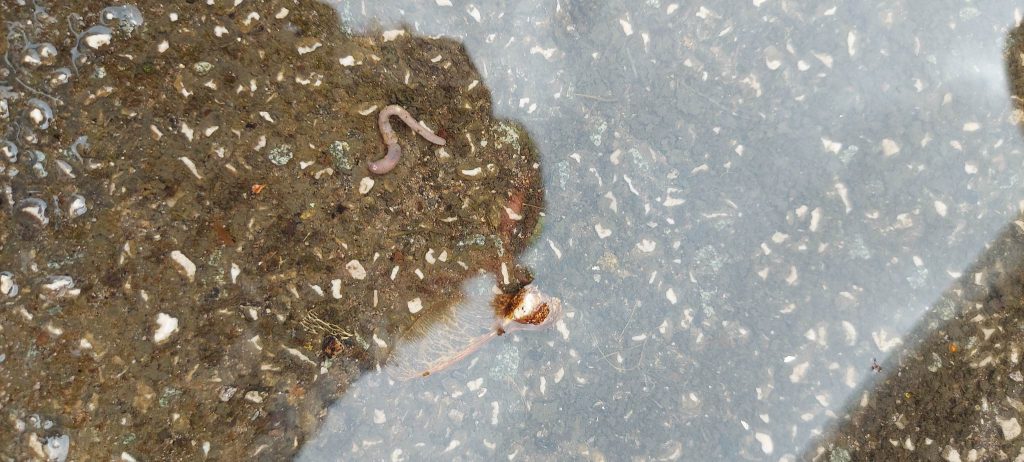
Laila was a bush pilot, crocodile hunter, face climber, BASE jumper and, more recently, wingsuit flyer. She was also asthmatic, arthritic, and anaemic. According to her doctor, she also suffered from tinnitus – a diagnosis that she had a hard time accepting. Initially, the doctor thought that her condition was caused by damage to auditory cells. When tests showed no damage, he termed it ‘perceived’ tinnitus. What she heard, on occasion, is a muffled clicking sound that seemed to come from a deep well. The clicking had a pattern although she couldn’t quite map it. She sure as hell knew it was not ‘perceived’ or ‘subjective’.
When billionaire Carlos’s New Horizons Corp announced it was seeking astronaut candidates to work on a Mars-orbiting space station, Laila jumped at the opportunity. Although she did not have a degree in science or engineering, her pilot experience and her notoriety helped her leapfrog to the front of the line. The notoriety was a good bet. One of the cable networks dug up a photo of a naked Laila with a python around her neck. When a reporter asked her if there was any truth to the story that she slept with the entire football team in college, she corrected him saying, “the basketball teams – men and women.” All of this brought tons of attention to the mission and the company’s stock went up which, in turn, helped the company raise more capital. Carlos couldn’t be happier.
During the two years of training, Laila noticed that the clicking sound got clearer and more distinct every time she performed zero-g manoeuvres. But then parabolic flight does all sorts of shit to the body, so she filed it under the ‘who the fuck knows’ bucket and forgot all about it. During launch, she was all nervous energy and during different stages of ignition, she was too excited about the prospect of leaving Earth’s orbit to focus on anything about herself. It was the same thrill she felt BASE jumping or wingsuit flying: Rush, Rush, Rush.
The clicking returned several months later during her first spacewalk. This time, the sound was more pronounced and had the structure of an algorithm. She found the experience quite unnerving. She kept telling herself, “This isn’t happening. Sound waves can’t travel through space.” In the following days, as she worked with the crew on the building blocks of the space station, she trained her mind to shut out the sound. Once phase I of the project was complete, she called ground control and asked to speak to Dr. Allen, the chief astrophysicist. Dr. Allen didn’t have an answer for her, but she asked Laila to document, as much as possible, her auditory experience. Laila was sure Dr. Allen meant auditory hallucination.
Back on earth, Laila noticed that her vision had gotten blurry and the clicking had returned, only this time it was no longer faint. She underwent a battery of tests and it was determined that weightlessness in space had reshaped the structure of her eyes. Neurobiologists called it neuro-ocular syndrome. The tests, however, found nothing wrong with her hearing. There was a lot of babble about auditory cortex and neural responses, but the simple conclusion Laila came to was that her hearing had gotten more acute to compensate for the vision loss.
There it rested until she got a call, one morning, from Dr. Chandra, an acoustic scientist at UK’s Centre of Astrophysics. They wanted to record the signals Laila’s auditory nerves were sending her brain. They wanted to compare them to the gravitational waves from solar flares, supernovae and other cosmic happenings that the Centre had been recording for years. Laila thought the whole idea was bizarre but agreed to participate in the study.
Two years later came the answer: The clicking sound Laila had been hearing came from a black hole 1.5 billion light years away. Soon they were finding ‘hearers’ all over the world – a farmer in Uzbekistan, a monk in Bhutan, a 24-week-old foetus inside a pregnant woman in Romania. The foetus could hear the clicking that the mother couldn’t. In the traditional and social media, the headline was the predictable ‘Is anybody out there?’ For Laila, the question was ‘how can I get there?’
Balu Swami lives in the US. His works have appeared in Ink Pantry, Adelaide Literary Magazine, Flash Fiction North, Short Kid Stories, Twist and Twain, and Literary Veganism.
You can find more of Balu’s work here on Ink Panty.
